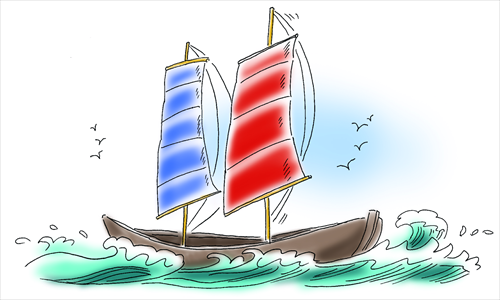Sino-EU ties help build multipolar world

Illustration: Liu Rui/GT
Chinese President Xi Jinping embarked on his first state visit to the UK this week. London hails golden ties with Beijing with its Chancellor George Osborne saying that the country wants to be "China's best partner in the West" earlier. There is no doubt that ties between China and Europe, with the Beijing-London relationship taking the lead, are witnessing a breakthrough.
Europe, in recent years, has been perplexed by several thorny problems, such as the debt crisis, Greek financial difficulties, the influx of refugees, to name but a few. It is hard for the EU to tackle these issues immediately. Its influence in the international arena is declining. By deepening its economic and trade cooperation with emerging China, Europe seeks to reverse the downward trend of its international clout.
China, on the other hand, has been actively participating in the reform and opening-up process and thus is witnessing a rapid development. The nation's economic grades, be it in trade, finance or GDP, rank among the highest in the world. Although it is undergoing an economic slowdown, China has secured its status as the world's second largest economy, which is growing sustainably. This has boosted Europe's confidence in cooperating with China.
In the meantime, China, renowned for its hospitality, is very willing to forge closer ties with other countries and regions. Beijing's intention to cooperate with Europe is becoming increasingly evident. Leaders of many European countries, such as UK Prime Minister David Cameron, German Chancellor Angela Merkel and French President Francois Hollande, are all seeking cooperation opportunities and have expressed goodwill to China on different occasions.
With the economy taking the lead, China-Europe cooperation is comprehensive, covering politics, culture and people-to-people exchanges. China befriends both individual European countries and the EU. The bilateral ties between China and Europe are at the best period of development in history and face great opportunities for further development.
Xi, during his official visit to the Netherlands, France, Germany and Belgium last year, said that it is necessary for China and Europe to build four "bridges" of peace, growth, reform and progress of civilization. With no strategic or geopolitical conflicts, the China-Europe relationship is relatively stable and the upward trend of bilateral cooperation is quite evident.
To develop closer China-Europe ties, it would be best if the two sides could sign a Bilateral Investment Treaty (BIT) in the near future. The BIT, if clinched, will be a milestone for the healthy and stable bilateral trade and economic development. Toward this end, both sides can make some concessions to each other.
Both sides jointly adopted the EU-China 2020 Strategic Agenda for Cooperation in 2013. The document can be perceived as a road map for bilateral cooperation, which has clearly laid out expectations for both sides in various fields including people-to-people exchanges, security and sustainable development. China and Europe should follow this guiding document for the sake of mutual benefits.
Admittedly, it would be hard for the EU to get rid of the influence of Washington, especially after the outbreak of the refugee crisis. The EU, as a US ally, is dependent on the US-dominated NATO in defense. The European countries have to rely on Washington, especially when facing terrorism, for instance, the Islamic State in the Middle East.
However, Europe is independent and mature enough to strike a balance between Washington and Beijing. It will not follow the US to contain China. Instead, Europe will prefer to be an onlooker, and, for the sake of its own benefits does not want the conflicts to escalate.
Developing the China-Europe relationship is of pivotal significance in this era when Beijing is involved in strategic competition with Washington as well as geopolitical conflicts with the neighboring countries, for instance, Japan. From this perspective, it is strategically meaningful for China to build warmer ties with the European countries.
Sino-European friendship also helps the world to become more multipolar. It has already been over 10 years since the EU-China Comprehensive Strategic Partnership was forged in 2003. Both sides share a lot in common. Europe is indispensable for the development of China, and vice versa.
The author is director of the Center for European Studies at Fudan University. opinion@globaltimes.com.cn
Read more in Special Coverage: